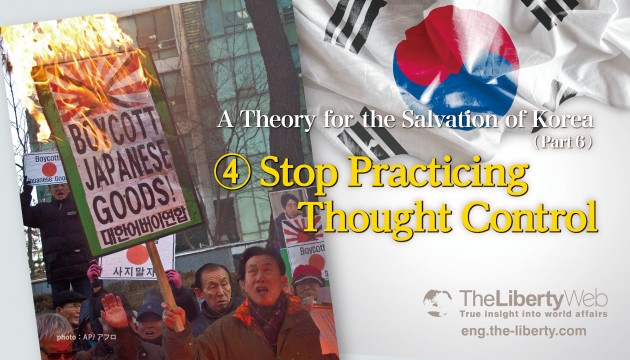A Theory for the Salvation of Korea (Part 6)
④Stop Practicing Thought Control
Pre-modern Korean beliefs include:
●A lack of freedom of speech
●Anti-Japanese historical records entirely based on lies
To pursue a path to modernization, Korea must:
●Accept various value systems
●Learn tolerance
●Introduce correct historical information to its citizens
Professor Oh Seon-hwa at the Takushoku University, a pro-Japanese person who was originally Korean and became naturalized in Japan, spoke on the suppression of free speech in Korea.
“Extinguishing different ways of thinking and trying to unify streams of thought have traditionally been the way of the Koreans. During the Joseon era, there was a system in place, even within families, where whoever criticized the government would be betrayed to it.”
Professor Oh, a whistleblower on the wrongs that Korea has committed with regard to its historical record and anti-Japanese sentiments, tried to return to Korea to attend a relative’s wedding last year, but the government refused her entrance at the airport. The reality has been, when it comes down to pro-Japanese talk in Korea, the rights of freedom of speech and expression have not been protected. In some cases, a person can even get arrested for contempt against the state.
The 1831 Constitution of Belgium was the first to prohibit censorship of works before publication. In America, censorship was prohibited in 1931. In Japan, it was established in the post-war constitution.
After the war, South Korea had reasons to continue its military regime. Soldiers had to guard against threats from North Korea. However, in 1980, due to a speech consolidation policy, the government forced a critical publication into cancellation. Even after the Koreans made their June 29th Declaration in 1987, control over information continued as it had in the past.
For example, the Korea Communications Commission forcibly closed some pro-Japanese sites and blogs, and there have been more cases where traffic to such sites has been restricted. Moreover, Korean leaders have prohibited the introduction of Japanese pop culture songs, movies, comics, and television shows up until 1998 for the reason that they might have had the potential to harm their citizens’ emotional states. Today, government regulations have become more relaxed, but they have not been removed.
Thought Control Is Ochlocracy
Where this information control can really be seen in their history education. Modernization and improvements to society, which Japan produced during the Annexation era, have been mostly ignored. Instead, the government has taught lies to its citizens about fictitious Japanese exploitations of its land and women.
Moreover, with the educational reforms after the war, hangul officially came into use, and Koreans lost the culture of using Chinese characters. They used to write the classics and the histories of the Korean Peninsula in Chinese characters. Now only a handful of elites, who can read Chinese characters, are able to study the historical writings of their own country. Even worse, most foreign historical texts have not been translated into the Korean language yet.
In the midst of such a consolidation of thought, the Koreans have become fiercely anti-Japanese in their public sentiments. To set the record straight on An Jung-geun, the international community did not oppose Japan’s annexation of Korea because he assassinated Hirobumi Ito. Yet, most Koreans still don’t question their treatment of An Jung-geun as a hero. This is quite simply nothing more than an ochlocracy policy.
This may be convenient for statesmen, but without the ability to understand various perspectives, it’s not possible to be effective members of the international community. Koreans will constantly misjudge what’s happening in the world. Doing away with thought control and moving towards a society where its citizens have free access to information will surely lead to Korea’s prosperity.
The Liberty asked Professor Oh about which reforms should be considered most important for Korean society.



















